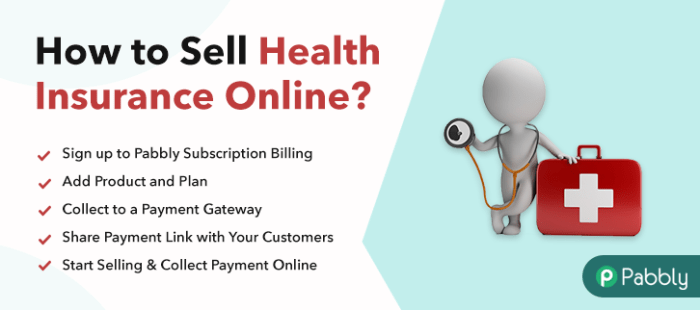In the realm of financial security, life and health insurance play a pivotal role in safeguarding individuals and families against unforeseen circumstances. As an insurance professional, mastering the art of selling these essential products requires a blend of expertise, empathy, and strategic planning.
This comprehensive guide delves into the intricacies of selling life and health insurance, providing valuable insights and practical tips to help you excel in this dynamic field.
From understanding the nuances of different insurance policies to building a robust professional network, this guide equips you with the knowledge and skills necessary to navigate the insurance landscape effectively. Discover how to identify your target audience, develop a compelling sales plan, and utilize marketing channels to reach and engage potential clients.
Learn the art of handling objections, providing exceptional customer service, and maintaining compliance with industry regulations.
Understanding Life and Health Insurance

Life and health insurance policies provide individuals and families with financial protection against unexpected life events. They ensure financial stability during difficult times and offer peace of mind, knowing that loved ones are secure.
Life insurance policies offer a death benefit to beneficiaries upon the insured’s passing, providing financial support to cover expenses, debts, or future needs. Health insurance policies, on the other hand, provide coverage for medical expenses incurred due to illness or injury, ensuring access to quality healthcare.
Types of Life Insurance
Life insurance policies come in various forms, each tailored to specific needs and circumstances. The most common types include:
- Term Life Insurance: Provides coverage for a specific period, typically ranging from 10 to 30 years. It offers affordable premiums and is suitable for individuals seeking temporary coverage.
- Whole Life Insurance: Provides lifelong coverage and includes a cash value component that grows over time. It offers permanent protection and the flexibility to borrow against the cash value.
- Universal Life Insurance: Combines features of term and whole life insurance, offering flexibility in premiums and death benefits. It provides lifelong coverage and allows for adjustments to the premium and death benefit as circumstances change.
Types of Health Insurance
Health insurance policies offer a wide range of coverage options, catering to different healthcare needs. Common types include:
- Major Medical Insurance: Provides coverage for a wide range of medical expenses, including hospital stays, surgeries, and prescription drugs. It offers comprehensive protection against major medical events.
- Supplemental Health Insurance: Complements major medical insurance by covering expenses not typically covered by traditional health insurance, such as dental, vision, or long-term care.
- Dental Insurance: Covers preventive and restorative dental care, including cleanings, fillings, and crowns. It helps maintain oral health and prevents costly dental procedures.
Significance of Life and Health Insurance
Life and health insurance policies play a crucial role in financial planning and risk management. They offer several benefits, including:
- Financial Protection: Life insurance provides a financial safety net for beneficiaries, ensuring they have the resources to cover expenses and maintain their standard of living in the event of the insured’s untimely death.
- Healthcare Access: Health insurance ensures access to quality healthcare services, enabling individuals to seek medical attention without financial burden. It promotes preventive care and early detection of illnesses, leading to better health outcomes.
- Peace of Mind: Life and health insurance policies provide peace of mind, knowing that loved ones are financially secure and have access to necessary healthcare services during challenging times.
Identifying Target Audience

Understanding the characteristics, motivations, and needs of potential customers is crucial for effective marketing and sales of life and health insurance products. By analyzing demographics and psychographics, insurance professionals can tailor their strategies to resonate with specific customer segments.
Factors Influencing Insurance Purchasing Decisions
Several factors influence individuals’ decisions to purchase life and health insurance, including:
- Age: Younger individuals may prioritize life insurance to protect their families, while older adults may focus on health insurance for long-term care needs.
- Income and Financial Situation: Individuals with higher incomes and stable financial situations are more likely to consider life and health insurance as a means of financial security.
- Family Status: Married couples and parents are more likely to purchase life and health insurance to provide financial protection for their loved ones.
- Health Status: Individuals with pre-existing medical conditions may be more motivated to purchase health insurance to cover potential medical expenses.
- Risk Tolerance: Individuals with a higher risk tolerance may be less inclined to purchase life and health insurance, while those with a lower risk tolerance may prioritize these products for peace of mind.
Strategies for Targeting Specific Customer Segments
Insurance professionals can employ various strategies to target specific customer segments effectively:
- Market Research and Data Analysis: Gathering and analyzing data on demographics, psychographics, and insurance purchasing behavior can provide valuable insights into the needs and preferences of different customer segments.
- Segmentation and Profiling: Dividing the target market into distinct segments based on shared characteristics and creating customer profiles for each segment allows for personalized marketing and messaging.
- Targeted Marketing Campaigns: Developing marketing campaigns tailored to the unique needs and interests of each customer segment can increase the effectiveness and relevance of marketing efforts.
- Partnerships and Alliances: Collaborating with organizations and businesses that serve specific customer segments can provide access to a wider audience and enhance the credibility of insurance products.
- Digital Marketing and Social Media: Utilizing digital channels and social media platforms to engage with potential customers, provide valuable information, and promote insurance products can reach a broader audience and drive conversions.
Building Expertise and Knowledge

In the realm of life and health insurance sales, staying updated on industry trends, regulations, and insurance policies is paramount to success. Possessing a deep understanding of insurance products and their benefits empowers you to communicate complex concepts effectively, catering to clients’ unique needs and concerns.
Continuous Learning and Updates
The insurance industry is dynamic, with evolving regulations, policies, and product offerings. Staying abreast of these changes ensures you remain a knowledgeable and trusted advisor to your clients. Allocate time for regular learning, attending industry conferences, workshops, and webinars to enhance your expertise.
Utilize online resources, such as industry blogs, whitepapers, and e-learning platforms, to stay informed.
Product Knowledge and Understanding
Gaining a thorough understanding of various insurance products is essential. Study policy provisions, benefits, exclusions, and riders to grasp the nuances of each product. Analyze the target market, identifying the specific needs and concerns they may have. By understanding the intricacies of insurance products, you can tailor your recommendations to suit each client’s unique situation.
Effective Communication and Client Engagement
Explaining complex insurance concepts to clients requires effective communication skills. Simplify technical jargon, using clear and concise language that resonates with your audience. Engage clients in interactive discussions, actively listening to their concerns and addressing their queries with empathy and professionalism.
Provide real-life examples and relatable scenarios to illustrate the benefits and importance of insurance coverage.
Establishing a Professional Network

Building a strong professional network is crucial for success in the life and health insurance industry. It allows you to connect with insurance professionals, financial advisors, and healthcare providers, which can lead to referrals, business growth, and valuable insights.
Expanding Your Network
- Attend industry events and conferences to meet potential clients, colleagues, and referral sources.
- Join professional organizations related to insurance, finance, and healthcare to connect with like-minded individuals.
- Use social media platforms like LinkedIn to connect with industry professionals and share valuable content.
- Attend local business networking events to expand your reach and build relationships within your community.
Leveraging Connections
- Ask for referrals from satisfied clients, colleagues, and other professionals in your network.
- Offer to co-host events or webinars with other professionals to cross-promote each other’s businesses.
- Share valuable insights and resources with your network to establish yourself as a thought leader.
- Be proactive in reaching out to your network and maintaining regular communication.
Maintaining a Positive Reputation
- Always conduct business with integrity and honesty, as your reputation is your most valuable asset.
- Provide exceptional customer service to ensure your clients are satisfied and likely to refer you to others.
- Continuously educate yourself and stay updated on industry trends to provide the best possible advice to your clients.
- Be an active member of your community and engage in activities that demonstrate your commitment to making a positive impact.
Developing Effective Sales Techniques

In the competitive world of life and health insurance sales, mastering effective techniques can significantly impact your success. By honing your skills in identifying customer needs, overcoming objections, and building strong relationships, you can increase your conversion rates and grow your business.
Understanding Customer Needs and Tailoring Solutions
Understanding your customers’ unique needs and goals is paramount in life and health insurance sales. By actively listening to their concerns, asking insightful questions, and analyzing their financial situation, you can tailor insurance solutions that align with their specific requirements.
This personalized approach demonstrates your expertise and builds trust, increasing the likelihood of a successful sale.
Overcoming Objections and Handling Difficult Situations
Objections are a natural part of the sales process, and handling them effectively can make or break a deal. Anticipate common objections related to cost, coverage, and the perceived value of insurance. Prepare well-reasoned responses that address these concerns and highlight the benefits of your products.
In difficult customer situations, remain calm, empathetic, and professional. Listen attentively, acknowledge their concerns, and find common ground to resolve the issue amicably.
Active Listening, Empathy, and Building Rapport
Active listening is a crucial skill in sales. Pay full attention to your customers, making eye contact and nodding to show that you are engaged. Ask open-ended questions to encourage them to elaborate on their needs and concerns. Demonstrate empathy by understanding their perspective and showing genuine care for their well-being.
Building rapport is essential for creating a connection with potential clients. Find common interests, share personal anecdotes, and show a genuine interest in their lives. This human touch can make all the difference in closing a sale.
Creating a Comprehensive Sales Plan

Setting clear sales goals and objectives is crucial for the success of any life and health insurance sales professional. A comprehensive sales plan provides a roadmap for achieving these goals and ensuring a systematic approach to selling.
Target Market Analysis
Understanding your target market is essential for tailoring your sales strategies effectively. Conduct thorough research to identify and analyze your ideal customer profile, including their demographics, needs, pain points, and buying behaviors.
Utilizing Marketing and Advertising Channels

To effectively market life and health insurance products, it’s essential to leverage various channels that resonate with your target audience. These channels provide platforms to communicate the value and benefits of your products, generate leads, and drive sales.
One key marketing channel is social media. With its vast reach and ability to target specific demographics, social media platforms like Facebook, Instagram, and LinkedIn offer opportunities to engage with potential customers, share informative content, and promote your products.
Content Marketing
Content marketing plays a crucial role in educating and informing your target audience about the significance of life and health insurance. By creating valuable content, such as blog posts, articles, infographics, and videos, you can establish yourself as a trusted resource and build credibility with potential customers.
- Optimization: Ensure your content is search engine optimized to improve its visibility and ranking in search results.
- Social Media Sharing: Share your content on social media platforms to expand your reach and attract new audiences.
- Email Campaigns: Utilize email marketing to nurture leads, provide valuable information, and promote your products.
Paid Advertising
Paid advertising offers a direct way to reach your target audience and promote your products. Platforms like Google Ads, Facebook Ads, and LinkedIn Ads allow you to target specific demographics, interests, and behaviors, ensuring your ads are seen by those most likely to be interested in your products.
- Effective Targeting: Utilize detailed targeting options to ensure your ads are shown to the right audience.
- Compelling Ad Copy: Create compelling ad copy that captures attention, communicates your value proposition, and encourages action.
- Landing Page Optimization: Design landing pages that are relevant to your ads and provide a seamless user experience.
Delivering Exceptional Customer Service
Customer service is crucial before, during, and after the sale to build trust and loyalty. It involves prompt and efficient handling of inquiries, resolving complaints with empathy and professionalism, and exceeding expectations whenever possible. This approach can help build long-term relationships with clients, ensuring their continued business and positive referrals.
Handling Customer Inquiries
-
-*Be Prompt and Attentive
Respond to inquiries promptly, ideally within 24 hours or less.
-*Personalize the Experience
Address the customer by name, understand their needs, and offer tailored solutions.
-*Provide Clear and Comprehensive Information
Ensure customers have all the information they need to make informed decisions.
Resolving Complaints
-
-*Listen and Empathize
Listen attentively to the customer’s complaint, empathize with their frustration, and acknowledge their concerns.
-*Take Ownership
Accept responsibility for resolving the issue, even if it’s not your fault.
-*Communicate Effectively
Keep the customer informed of progress, apologize for any inconvenience, and offer a fair resolution.
Building Long-Term Relationships
-
-*Stay in Touch
Reach out to clients regularly with valuable information, updates, and offers.
-*Provide Exceptional Service
Always go the extra mile to deliver exceptional service, exceeding customer expectations.
-*Be a Trustworthy Advisor
Build trust by being honest, transparent, and always acting in the client’s best interest.
Staying Compliant and Ethical
In the realm of life and health insurance sales, maintaining compliance and adhering to ethical standards are non-negotiable.
These principles form the foundation of a successful and sustainable career, safeguarding the interests of clients, upholding the integrity of the industry, and ensuring that you operate within the boundaries of the law.
To navigate this landscape effectively, consider the following strategies:
Staying Up-to-Date on Regulatory Changes
The regulatory landscape surrounding life and health insurance is dynamic and ever-changing. Staying abreast of these developments is crucial for ensuring compliance. Consider these tips:
- Subscribe to industry publications, newsletters, and online resources that provide regular updates on regulatory changes.
- Attend industry conferences, workshops, and seminars to stay informed about the latest developments and best practices.
- Actively seek out continuing education opportunities to enhance your knowledge and understanding of regulatory requirements.
Ensuring Compliance
Compliance goes beyond merely being aware of regulations. It requires a proactive approach to implementing and maintaining compliance measures. Here’s how:
- Develop and implement a comprehensive compliance program that Artikels your policies, procedures, and processes for ensuring compliance with all applicable laws and regulations.
- Regularly review and update your compliance program to reflect changes in regulations and industry best practices.
- Conduct regular audits and reviews to assess your compliance efforts and identify areas for improvement.
Maintaining Integrity and Professionalism
Beyond compliance, maintaining a high level of integrity and professionalism is essential for building trust and credibility with clients and colleagues. Consider these guidelines:
- Always act in the best interests of your clients, providing them with sound advice and guidance tailored to their unique needs and circumstances.
- Be transparent and honest in all your interactions, avoiding any misleading or deceptive practices.
- Maintain a high level of professionalism in your conduct, dress, and demeanor, reflecting positively on yourself and the industry.
Continuous Learning and Professional Development

In the dynamic world of insurance, ongoing learning and professional development are paramount for success. Insurance professionals must continually enhance their knowledge and skills to stay competitive, adapt to evolving regulations, and deliver exceptional customer service.
Identifying and Accessing Relevant Training Programs
Insurance professionals can identify relevant training programs and workshops by exploring the following avenues:
Industry Associations
Joining professional associations, such as the National Association of Insurance and Financial Advisors (NAIFA) or the Society of Financial Service Professionals (SFSP), provides access to educational resources, conferences, and training programs tailored to the insurance industry.
Insurance Companies
Many insurance companies offer in-house training programs and workshops to their agents and advisors. These programs often cover product knowledge, sales techniques, and regulatory compliance.
Online Courses and Webinars
Numerous online platforms and educational institutions offer insurance-related courses and webinars. These courses provide flexibility and convenience for professionals who prefer self-paced learning.
Conferences and Seminars
Attending industry conferences and seminars is an excellent way to stay updated on the latest trends and developments in the insurance sector. These events also offer networking opportunities with peers and industry experts.
Staying Current with Industry Trends and Best Practices
Insurance professionals can stay current with industry trends and best practices by employing the following strategies:
Reading Industry Publications
Subscribing to industry magazines, journals, and newsletters keeps professionals informed about the latest news, regulations, and best practices in the insurance sector.
Participating in Online Forums and Communities
Engaging in online forums, discussion groups, and social media communities dedicated to insurance provides a platform for exchanging ideas, sharing insights, and learning from peers.
Attending Industry Events
Participating in industry events, such as conferences, seminars, and workshops, allows professionals to connect with experts, learn about new products and services, and stay abreast of emerging trends.
Networking with Peers and Industry Experts
Building a network of peers and industry experts through professional associations, conferences, and online communities facilitates the exchange of knowledge, insights, and best practices.
Conclusion
Selling life and health insurance is not merely a transaction; it is an opportunity to make a meaningful difference in the lives of your clients. By embracing the principles Artikeld in this guide, you can unlock your full potential as an insurance professional, providing invaluable protection and peace of mind to those who need it most.
Remember, success in this field is not just about closing deals; it is about building lasting relationships and earning the trust of your clients. Embrace the challenge, stay committed to continuous learning, and watch your career soar to new heights.
Helpful Answers
What are the key factors that influence insurance purchasing decisions?
Factors that influence insurance purchasing decisions include age, income, family status, health status, risk tolerance, and financial goals.
How can I effectively target specific customer segments for life and health insurance?
To effectively target specific customer segments, consider conducting market research, analyzing demographics and psychographics, understanding customer needs and pain points, and personalizing your marketing messages.
What are some effective strategies for overcoming objections and handling difficult customer situations?
To overcome objections and handle difficult customer situations, employ active listening skills, empathize with the customer’s perspective, provide clear and concise explanations, offer alternative solutions, and maintain a professional and courteous demeanor.
How can I create a comprehensive sales plan for life and health insurance?
To create a comprehensive sales plan, start by setting clear goals and objectives, analyzing your target market, researching competitors, developing a marketing strategy, allocating resources, and tracking your progress.
What are some tips for providing exceptional customer service before, during, and after the sale?
To provide exceptional customer service, be responsive to inquiries, handle complaints promptly and professionally, exceed expectations whenever possible, build rapport with clients, and go the extra mile to ensure their satisfaction.



